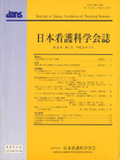Japanese
English
- 販売していません
- Abstract 文献概要
- 参考文献 Reference
- サイト内被引用 Cited by
要旨
目的:慢性腎臓病(CKD)対象者に非盲検ランダム化比較試験におけるEASEプログラムを実施し,血圧,血圧測定実施率およびセルフマネジメント行動や自己効力感が向上するかどうかを検証した.
方法:介入群(n=19)はEASEプログラムを12週間実施し,対照群(n=12)は従来の教育を実施した.介入の効果指標は,4週ごとの平均血圧値および血圧測定実施率,セルフマネジメント行動,自己効力感である.
結果:2群間における効果指標に有意差は認められなかったが,介入群のセルフマネジメント行動は介入前後で有意に向上した.自己効力感の中央値は介入群で上昇し,対照群は低下した.血圧測定実施率は両群とも1~4週に比べ,9~12週が有意に低下した.とくに対照群における測定実施率の低下は大きかった.
結論:ランダム化比較試験の結果,効果指標に有意差は認められなかった.しかし介入群のセルフマネジメント行動は向上した.よってEASEプログラムはセルフマネジメント行動に効果があることが示された.
Abstract
Purpose: We performed intervention using the EASE program in a non-blind randomized controlled trial in patients with chronic kidney disease (CKD), and evaluated its effects on mean blood pressure and blood pressure measurement rate, self-management behavior and perceived self-efficacy.
Methods: In the intervention group (n=19), intervention using the EASE program was performed for 12 weeks. The control group (n=12) received conventional education. The parameters of intervention effects were the mean blood pressure and blood pressure measurement rate during every 4-week period and self-management behavior, perceived self-efficacy.
Results: No significant difference was observed in the effect parameters between the two groups. However, in the intervention group, self-management behavior significantly improved after intervention. The median value of perceived self-efficacy increased in the intervention group but decreased in the control group. The blood pressure measurement rate significantly decreased during the period after 9-12 weeks compared with the period after 1-4 weeks in both groups, and the decrease was marked in the control group.
Conclusion: A randomized controlled trial showed no significant difference in the effect parameters. However, in the intervention group, self-management behavior significantly improved after intervention. EASE program has therefore been shown to be effective self-management behavior.
Copyright © 2012, Japan Academy of Nursing Science. All rights reserved.


